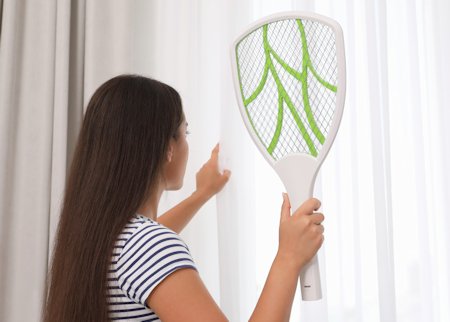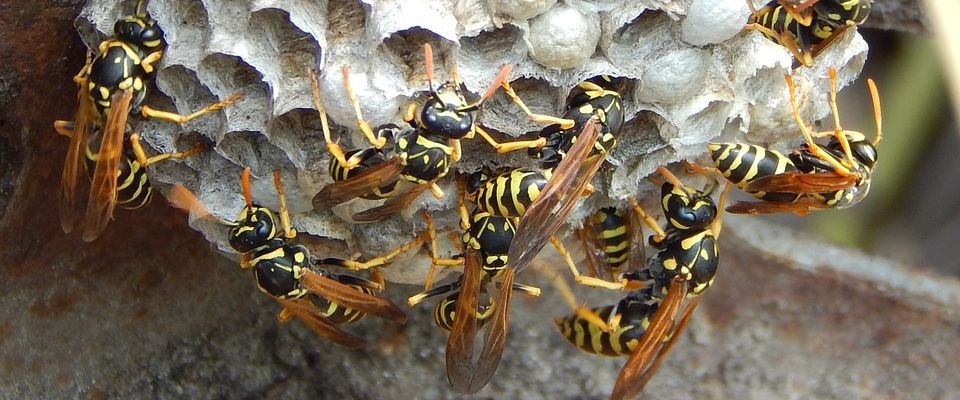A Guide on How to Deal With Wasps & Wasp Nests
Wasps are the bane of most people’s lives, but can be advantageous to the garden.
The workers are kept busy in the spring and early summer, feeding the grubs with a variety of insects, especially aphids who devastate our plants. The workers are rewarded by the grubs who secrete a liquid which is full of sugar and proteins that the workers need. This is where the problems start! The worker wasps become addicted to the sugar and once the grubs are gone, they seek other sources - our food & drinks.
So, how do we deal with these pests that can be beneficial to our gardens?
Deterrence
 The 'No More Wasps Waspinator' sounds like a joke but it really does work. Available as a twin pack, you fill the weather resistant bags and then hang them around your home or garden, where you want to deter wasps. As wasps are very territorial, when they see what looks like another wasp nest they will steer clear of the area.
The 'No More Wasps Waspinator' sounds like a joke but it really does work. Available as a twin pack, you fill the weather resistant bags and then hang them around your home or garden, where you want to deter wasps. As wasps are very territorial, when they see what looks like another wasp nest they will steer clear of the area.
Trapping
The 'honeypot wasp trap' is ideal for putting out in the garden to attract wasps away from your home or outdoor seating area. Simply fill the trap with a special bait to attract the wasps to it and away from you.
Once they climb inside the entrance, they will not be able to find a way out, resulting in heat exhaustion or drowning in the liquid bait.
Do be careful when cleaning the nest out, as some may still be alive, so it is best to immerse the trap in water to ensure all the wasps drown before you open it to clean it out for reuse.
Killing
Without a doubt the traditional fly swats and flying insect sprays such as Kybosh or Nippon fly and wasp spray are very effective at killing wasps as is the electric bug bat. However, if there is a nest in the house or garden shed, there are several ways of dealing with it that may be better suited.

The safest way is to fumigate the room in which the nest is located, using smoke bombs or foggers. These fill the area with a smoke that kills the wasps, however you have to seal the area first and leave it to work before unsealing and allowing to ventilate. Fumigation is not always practical for where the nest is located and this is where foams and powders come in.
Powders can be puffed into cracks and holes where the wasps are coming in and out so that they come into direct contact with the powder and die. Powders are best used when you can't see the nest.
Foam sprays work by spraying a jet of foam up to 3 metres or 10 feet. These are best used if you can see the nest or it is in some sort of cavity which you can fill with the foam. If you can directly target the nest the foam will also start to dissolve the nest.
The best time to kill the wasps in their nest is early morning or late afternoon/early evening when they are all still in the nest.
It is very important that you keep children and pets away and do not attempt this if you are allergic to wasp stings, as you would be better off calling a professional than risking your own health. If you choose to deal with a nest yourself, always have a can of wasp spray to hand to kill any that come close when you are destroying the nest and have as little exposed skin as possible.
What not to do with wasp nests:

Do not use fire or water to destroy nests as they are highly flammable and can start a fire that gets quickly out of control endangering your property and water takes a while to dissolve nests so if it’s indoors you will cause water damage especially to any nearby electrics.
Do not attempt to knock down nests with sticks, golf clubs or bats as this will cause all the wasps to come storming out of the nest to sting you.
Remember that wasps are very helpful in the garden as pest controllers and only become a pest to us near the end of their lives, so avoid them if you can and always follow the instructions when using any pesticides.








